A click of the call button brings in a nurse as a mom soothes her baby as he begins to whine out of hunger. Instead of cuddling up with her baby to feed, mom watches as the nurse hangs a syringe-full of mother’s pumped breastmilk. The breastmilk, filled with antibodies and other important substances to help her baby grow, is then hooked up to tubing that is threaded through baby’s nose and down to his stomach. Mom stands next to baby, rubbing his arm lightly because she cannot pick up her fragile baby, born at only 26 weeks. This scene is common in the Neonatal Intensive Care Unit (NICU).
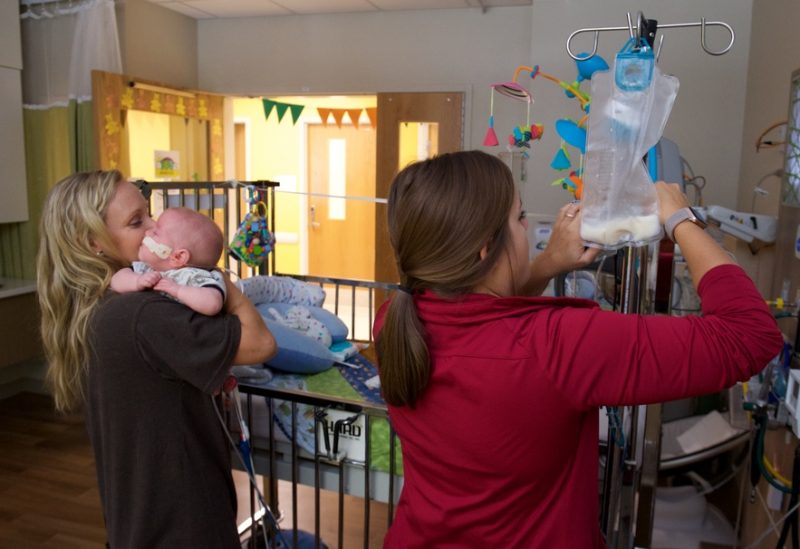
Nurse Jenna Berryhill hooks up Michelle DeAngelis’s breastmilk to feed to Michelle’s son, Sonny, via NG-tube.
For NICU moms, breastfeeding is a different journey. National Breastfeeding Month brings important attention to breastfeeding, but moms of premature and sick babies feel like they are not included. Breastfeeding for them does not follow the traditional path. Many moms give birth weeks or even months early, before they even have a chance to do their breastfeeding research or take classes.

Amy Johnson and her son, Quinten, enjoy some skin-to-skin time, a proven method to improve bonding between mother and baby as well as increase milk supply for mom.
Suddenly they are in the world of motherhood, and it is not what they pictured when they thought of those first few days with baby. From pumping, to feeding tubes, to struggles with supply for some mothers, breastfeeding NICU moms find themselves working to make sure their baby has the very best nourishment, sometimes without even seeing their baby yet. Despite the struggles, these moms do what is best for their babies. Studies prove breast milk is life-saving ‘medicine’ for premature infants, and all babies greatly benefit from breastmilk.
When a baby is unable to nurse following birth, according to the Akron Children’s lactation team, the most important thing a mom can do to support her baby and her breastfeeding journey is to begin pumping as soon as possible, ideally in the first 1-2 hours after birth. Akron Children’s provides a pump for every mom currently in Akron Children’s NICUs and Special Care Nursery locations, as well as access to lactation teams to give moms the smoothest road through breastfeeding.
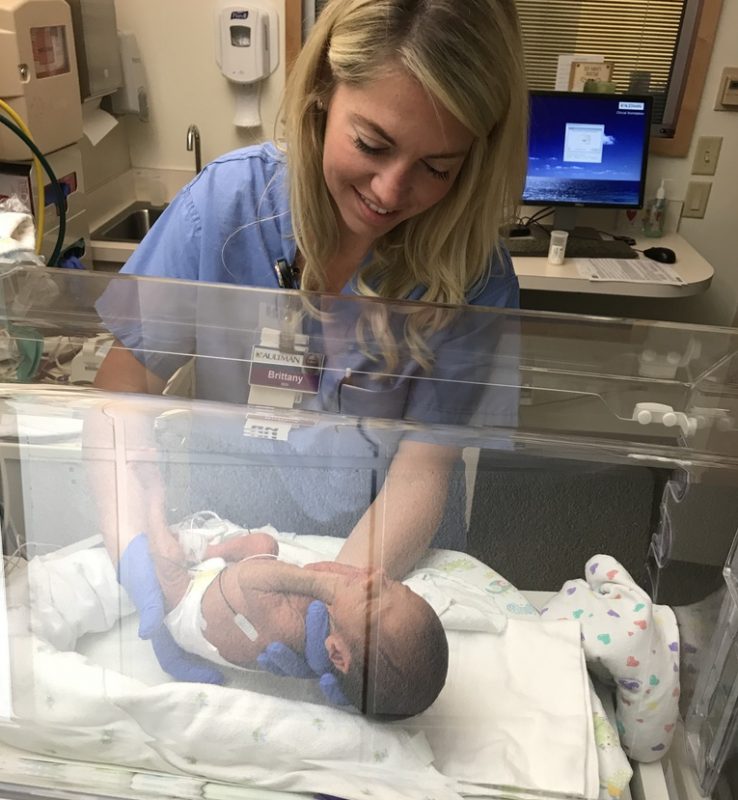
In our new NICU unit at Aultman Hospital, nurse Brittany Curlutu gently places Quinten Johnson in his isolette after bonding with his mom, Amy. Quinten will get breastmilk via NG-tube after being settled into his bed.
Ways to feed
Once a mother’s milk comes in, there are many ways to feed NICU babies. A common sight in the NICU are orogastric (OG) and nasogastric (NG) tubes. OG-tubes are put through the mouth and into the stomach, while NG-tubes are put through the nose and into the stomach. These are used when babies are unable to suckle and swallow milk on their own and cannot go to breast or take a bottle. Depending on the babies progress, some will need a more long-term solution called a gastrostomy tube, also known as a G-tube. A G-tube is a tube inserted through the abdomen that delivers nutrition directly to the stomach. This is for babies who are still working on their eating skills. Others will progress to bottle-feeding and ideally go to breast. Whatever the method, though, the important thing is the baby is fed and receiving nutrients from mom.

Baby Taylor, born at 24 weeks gestation, has been working hard to graduate from her NG-tube. She is currently working on her skills with bottle-feeding and going to breast.
While in the NICU, moms are fighting many factors in their milk supply. From stress, to lack of physical connection with baby, to recovering from the birth, it can be hard for NICU moms to get started and stay on track with milk supply. Fortunately for moms at Akron Children’s, the lactation team is there to help. Liz Maseth, the nurse program coordinator and an Internationally Board Certified Lactation Consultant at Akron Children’s, and her team, including lactation consultants Michelle Lounsbury, Gina Mizer, Aimee Bintrim, Erika Hayslip and Carol Frient, are constantly on the move and ready to support moms.
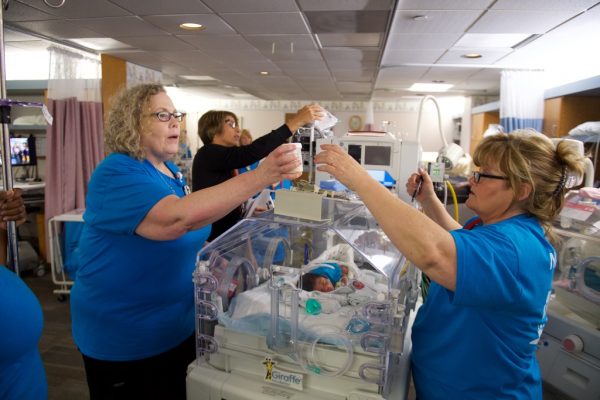
Liz Maseth (left), nurse program coordinator and an Internationally Board Certified Lactation Consultant, hands nurse Joanie Benzo a container of breastmilk as they transport babies during the recent move of our NICU at Summa Health’s Akron City Hospital. The lactation team plays an important role in supporting both moms and babies in the NICU.
Abbey Workman delivered her son, Thomas, at 27 weeks gestation and was transferred to Akron Children’s. During their stay, Abbey appeared to have lost her entire milk supply and thought her breastfeeding journey was over. Abbey consulted with the lactation team and after a great deal of pumping and focusing on time with her baby to increase supply, not only is Thomas receiving Abbey’s breastmilk, he graduated from his NG-tube to a mix of bottle and breastfeeding. The best advice Abbey received from Liz and her team? “Power through!” she said. “Breastfeeding gets hard, especially when you can’t hold your baby, but sit by them, hold their hand and keep going.”
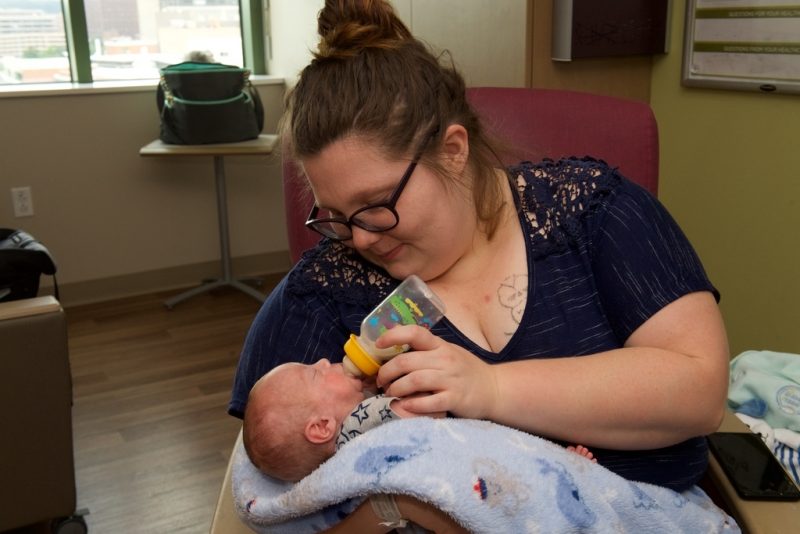
Abbey Workman gave birth to her first child, Thomas, 13 weeks early. Born at a mere 1 pound, 12 ounces, it was important for Thomas to have the most nutritious meals possible. After working with the lactation team, Abbey is able to supply Thomas with plenty of breastmilk. Thomas is now 5 pounds, 2 ounces and was recently discharged. Way to go, Abbey and Thomas!
The lactation team goes to great lengths to stay on the forefront of breastfeeding research and trying everything to help babies receive breastmilk. For moms in same-sex relationships, adoptive moms and foster moms, they have options, too! The lactation team works with these moms to induce lactation. Induced lactation is the practice of helping a woman who has not been pregnant produce milk. Nicole, a NICU mom, struggled with her supply through the stress of the loss of one of her twin daughters and watching her other daughter fight for her life. Her wife, Laurie, worked with Liz to begin the process of induced lactation, using the Newman-Goldfarb Protocols for Induced Lactation. Nicole later began producing again with the help of the lactation team, and their daughter is thriving and working her way toward her discharge.
Through the bumps in the road, these NICU moms triumph. Lauryn Neisel sees her bottles of breastmilk as trophies she earned for her daughter, Agnes, who arrived in a rush at 32 weeks gestation. Lauryn had a hard time with the contrast between her first child, who was born full-term. She missed the snuggled-up bonding time and struggled with supply while pumping. Abbey’s motivation was reminding herself that this was something only she could do for her daughter, something she took great pride in.

Agnes Neisel made a quick entrance to the world after her mom, Lauryn, went into labor at 32 weeks. Lauryn had to adjust to being a NICU mom and having this new breastfeeding journey after previously having a more typical experience with her son.
Motherly advice
While in the NICU, we asked moms for advice on breastfeeding for other NICU parents. All of the moms recommend reaching out to lactation specialists. Michelle DeAngelis, mom to Sonny, who was born at only 24 weeks gestation after preterm labor, found Akron Children’s team supportive without pressuring her. Michelle has been able to stay very involved with Sonny’s care and focuses on being present when in the hospital which contributed to her increase in supply. Liz and her team also recommend reaching out to other moms. Liz hosts a weekly gathering of moms to talk about their success and difficulties with breastfeeding.
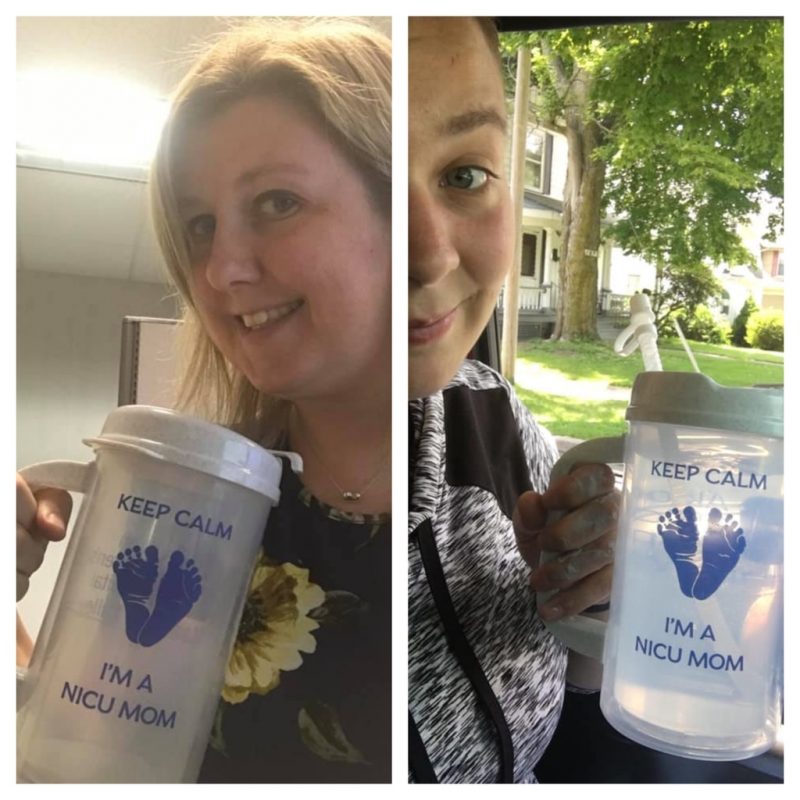
Jen Phillips (left) and Pamela Young (right) show off their NICU mugs. Both women are part of the Mahoning Valley Miracles NICU group on Facebook. Thanks to this community, NICU moms can support one another through the difficult moments and the triumphs when it comes to having a baby in the NICU, including breastfeeding.
Other advice included having contact with baby. Even if you can’t hold your baby, hold their hand, sit close and talk with baby. There is power in that warm, fuzzy feeling your baby gives you and is proven to help supply. It is also important to remember that your breastfeeding experience is just that, yours. The lactation team works on individualized plans for moms. What works best for one mom may not be the best plan for another. It is important to focus on only your breastfeeding journey and not compare to others.

At the end of his feeding, Sonny DeAngelis drifts off to sleep with a belly full of breastmilk. You would never know this big boy was only 1 pound, 6 ounces at birth. Sonny’s mother, Michelle, has put in many hours of pumping to make sure Sonny is well fed.
In the end, the most important thing is baby is being fed, no matter if it is via tube, bottle or breast. Moms are amazing at supporting their babies in any way they can, and it is important to empower all of our moms. This National Breastfeeding Month, if you are a breastfeeding mom, give yourself a pat on the back as you provide the best for your baby.










